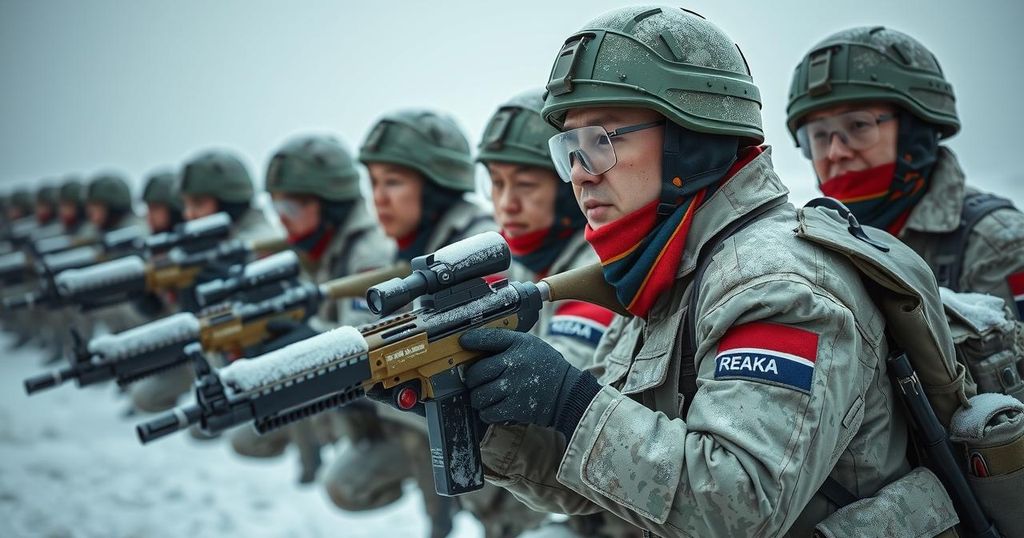Former North Korean soldiers who defected share their experiences and insights regarding North Korean troops currently deployed in Russia’s war against Ukraine. Reports indicate that approximately 11,000 North Korean soldiers, particularly from the elite Storm Corps, have joined the fight, facing challenges such as malnutrition and training limitations. Despite their loyalty and high morale, the effectiveness of these troops in modern warfare remains uncertain, and the potential for defections is complicated by deep ideological conditioning and military discipline.
Haneul, a former North Korean soldier, vividly recalls the relentless hunger he experienced during his military service. In his first month, he lost a significant amount of weight due to a meager diet consisting mainly of cracked corn and moldy cabbage, leading to widespread malnutrition among his battalion. Although conditions improved slightly upon deployment, significant portions of their rice rations were siphoned off, leaving many soldiers still famished. Haneul eventually defected in 2012 after a harrowing escape across the Demilitarized Zone (DMZ). This personal account, alongside insights from other defectors, sheds light on the situation of North Korean troops now reportedly assisting Russian forces in Ukraine.
Recent developments suggest that approximately 11,000 North Korean soldiers have been deployed to support Russian operations aimed at reclaiming territory in Ukraine’s Kursk region. Intelligence reports indicate these troops have already suffered casualties, raising concerns about their effectiveness in contemporary warfare. While South Korean intelligence highlights that many of these soldiers belong to the elite Storm Corps, they remain largely unaccustomed to modern combat scenarios despite their higher morale. The training for the Storm Corps focuses on martial arts and unconventional warfare, yet fundamental issues such as malnutrition persist.
Defectors highlight the disconnect between the perception of North Korean military strength and the reality on the ground. While the Storm Corps are trained to conduct infiltrative operations behind enemy lines, their transition from the mountainous terrain of Korea to the flat battlefields of Ukraine presents new challenges. The language barrier further complicates their integration into Russian forces, leading to miscommunication and accidental fire on allied troops. Nonetheless, defectors emphasize that the North Korean soldiers’ unwavering loyalty to their regime may bolster their resolve in combat situations.
The psychological conditioning undergone by soldiers, combined with ideological training, could enhance their readiness for conflict. Many soldiers view deployment as an opportunity to enhance their military careers, given the oppressive conditions they endure in North Korea. Observers note that even faced with the harsh realities of warfare, these troops may demonstrate a higher willingness to fight compared to their Russian counterparts.
However, the prospect of large-scale defections seems unlikely, as the North Korean military highly discourages surrender, often equating it with disgrace. Defectors express skepticism about the success of psychological operations aimed at encouraging surrender among North Korean troops stationed in Ukraine, citing cultural conditioning against such actions. Additionally, capturing North Korean soldiers may prove difficult, as they are ingrained with the notion of fighting to the death, contradicting the concept of yielding.
In conclusion, while North Korean soldiers are facing significant logistical and operational challenges in their involvement with Russian forces, their ideological devotion and military training may still render them capable combatants in varying capacities. The deployment of these troops raises issues of international implication and underscored the complex dynamics of loyalty, survival, and adaptation in wartime. Despite considerable obstacles, their performance remains an aspect of interest for military analysts observing the unfolding conflict in Ukraine.
This article discusses the experiences of defectors from the North Korean military, providing insight into the challenges faced by North Korean soldiers deployed in Russia’s conflict against Ukraine. It highlights the dire conditions within the North Korean military, including severe malnutrition and meager resources. Additionally, the article elaborates on how North Korea’s military capabilities, especially among trained units like the Storm Corps, may impact their effectiveness on the battlefield and raises questions about potential defections based on ideological loyalty and military discipline.
In conclusion, the articles reflect the precarious position of North Korean soldiers deployed to assist Russian forces in Ukraine. Despite limited resources and severe training conditions, the ideological conditioning and loyalty of these soldiers may enhance their determination and effectiveness in combat. Understanding their background and motivations is critical for interpreting their role in ongoing military conflicts and the complexities of defection in high-stakes scenarios.
Original Source: www.bbc.com







